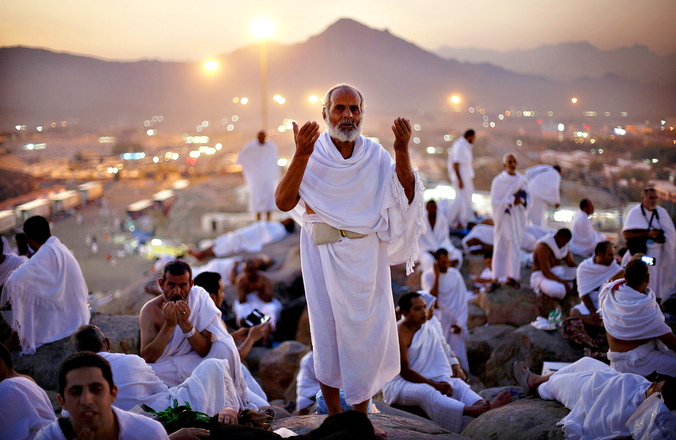History bears witness that conflict arises when people feel their wants aren’t met. This leads to dissatisfaction, and subsequent anger, leading to conflict. For peace to prevail, it is quintessential for satisfaction to prevail, and one of the ways of achieving it would be promoting a sense of equality. While it might be a utopian concept to think that everyone would be equal – It is certainly true for people to be equally important. Islam holds this view that every human is equally important, and while some people might be more exalted than others, the measure for this is piety righteousness and God consciousness.
As the hajj season fast approaches, we review some of its most iconic rituals.
Millions of people gather together in and around Makkah, dressed in the simple attire called the Ihram. It consists of two pieces of unstitched clothes, the same dress worn by every individual – the rich and the poor, the privileged and the destitute, regardless of nationality, race or any other such manmade parameter.
When pilgrims from different backgrounds and cultures come to perform hajj, they use more or less the same facilities as the others in their group as well as those beyond it: makeshift toilets, packaged food, rolled-up bedding, and tented accommodations. They all have luggage with them. They all eat, sleep, and worship more or less at the same time. And they all silently and readily agree – as if on cue from their Lord above – to set aside their political, ideological, religious, and jurisprudential differences for the entire duration of the sacred hajj sojourn.
The state of Ihram is not just a matter of clothing. It also carries an aura of calm and self restraint. The pilgrims enter a state of forbearance , politeness, calmness and self-restraint in dealing with the people around them. Allah says in the Qur’an:
The best way to unite and make peace with pilgrim brethren is to tolerate anything negative that happens with patience and kindness and to seek out every opportunity to help relieve the problems and distress of those pilgrims who need help.
For Hajj are the months well known. If any one undertakes that duty therein, Let there be no obscenity, nor wickedness, nor wrangling in the Hajj. And whatever good ye do, (be sure) Allah knoweth it. And take a provision (With you) for the journey, but the best of provisions is right conduct. So fear Me, o ye that are wise. (2:197)
A follower of one school of thought prays next to one who follows another school of thought, and may do something different from him like raising his hands before or after the ritual bowing (rukoo’), yet both of them stand shoulder to shoulder to perform rituals. And both remain mutually respectful about it. There are no arguments or confrontations. As they converge together upon the plain of Arafat, all pilgrims pray four units of Salah behind one imam, and seek forgiveness henceforth till sundown from one God, Allah. No divisions, no differences. One purpose, one place, one nation.
Once the pilgrims are done with the circumambulating the House of God (Tawaf al ifadah), all that remains of the rituals for them to do during their remaining stay at Mina is to perform the stoning of pillars (jamraat) on a daily basis. This means that most pilgrims have ample free time to socialize and talk to each other throughout their 4-5 day stay at Mina. How can pilgrims capitalize on their stay in Mina in order to promote better mutual understanding, unity, peace and respect? Well, for one thing, they should avoid snapping or blowing their fuse whenever something done by their brethren really bothers or irritates them — If sister loses her bag of medicines due to the negligence of her companion, a brother has trouble napping or sleeping soundly because the ‘uncle’ on the bed next to him constantly snores, and the one on the other side keeps talking loudly on his phone, a sister’s nap is disturbed when another steps heavily on her foot whilst sprinting across the tent.The short stay at Mina can test everyone’s nerves and patience, because it is a state of bare-basics traveling peppered with the performance of time-bound hajj rituals. The ages, physical abilities, personalities, habits, and varying backgrounds of the pilgrims in each tent transform the otherwise desolate city of Mina into a wonderful melting pot of diversity.The best way to unite and make peace with pilgrim brethren is to tolerate anything negative that happens with patience and kindness and to seek out every opportunity to help relieve the problems and distress of those pilgrims who need help.
And of course what remains to be done is the same, but only on a constant basis, throughout the year – make peace with everyone, tolerating the negatives and seeking opportunities to help others. Being satisfied with self and others, and helping them achieve the same. Hajj is not merely a religious obligation or a pilgrimage, it is a life changing experience. A training camp, if one may call it, for leading a peaceful life.






